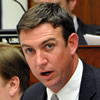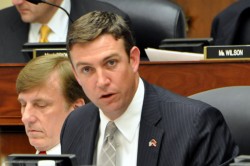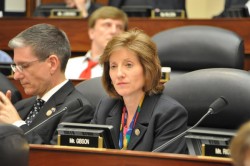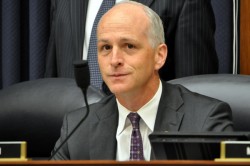National
House panel adopts anti-gay amendments in defense bill
Amendments reaffirm DOMA, could disrupt ‘Don’t Ask’ repeal


Rep. Duncan Hunter introduced an amendment that could disrupt 'Don't Ask' repeal (Blade photo by Michael Key)
A House defense committee approved on Wednesday a series of anti-gay amendments as part of major Pentagon budget legislation aimed at disrupting the process for repealing “Don’t Ask, Don’t Tell” and at demonstrating support for the Defense of Marriage Act.
The most high-profile amendment came from Rep. Duncan Hunter (R-Calif.), who introduced a measure that would expand the certification requirement needed for repeal to include input from the four military service chiefs. The Republican-controlled House Armed Services Committee voted 33-27 in favor of adopting the measure as part of the fiscal year 2012 defense authorization bill.
The vote in favor of the Hunter amendment was mostly along party lines, although Reps. Todd Platts (R-Pa.) and Chris Gibson (R-N.Y.) voted against the measure. Rep. Mike McIntyre (D-N.C.) was the sole Democrat to vote in favor of the measure.
The repeal legislation signed into law in December allows for repeal of “Don’t Ask, Don’t Tell” after 60 days pass following certification from the president, the defense secretary and the chair of the Joint Chiefs of Staff. Hunter’s amendment would expand the certification requirement to include input from the uniform chiefs of staff for the Army, Navy, Air Force and Marine Corps.
Hunter, a Marine Corps veteran of Iraq and Afghanistan, billed the amendment as a means to ensure the uniform military leaders — which he described “the ones that are actually responsible for the men and women under their care” — are able to express their opinion before moving forward with “Don’t Ask, Don’t Tell” repeal.
“Right now as it stands, the only folks that have to sign on to this are the president, who has never been to war or in ground combat, Adm. [Mike] Mullen, who, with all due respect to him, has never been to ground combat in Iraq or Afghanistan, and Secretary Gates, a political appointee, who is a very fine gentleman, but has never been in ground combat in Iraq or Afghanistan,” Hunter said. “I, and others in this room, have more combat experience than the people who would sign off on the repeal of ‘Don’t Ask, Don’t Tell.'”
Hunter emphasized his amendment would require the service chiefs to issue certification only based on their belief that “Don’t Ask, Don’t Tell” repeal wouldn’t harm morale and unit cohesion for combat arms units under their jurisdiction. According to the Pentagon survey published in November, these units are the most skeptical about whether open service would cause a disruption in the U.S. military.
Involving the military service chiefs in the “Don’t Ask, Don’t Tell” repeal certification process could disrupt or delay open service in the U.S. military because some uniform leaders of the military — notably Marine Corps Commandant Gen. James Amos — expressed opposition to passing repeal legislation last year. Amos has since said the Marine Corps would work to implement open service.
Despite the concerns that were expressed last year, each of the service chiefs testified in April that the process for enacting “Don’t Ask, Don’t Tell” repeal has been proceeding smoothly. Some service chiefs — including Chief of Naval Operations Adm. Gary Roughead — have said they oppose any effort to expand the certification requirement and they believe the defense secretary would adequately represent their views in the certification process.
Many Republican committee members voiced support for the Hunter amendment as they expressed opposition to implementing open service in the U.S. military.
Rep. Doug Lamborn (R-Colo.) said he supported the amendment because the president, the defense secretary and the chairman of the Joint Chiefs of Staff had already backed “Don’t Ask, Don’t Tell” repeal before Congress acted to end the military’s gay ban.
“I always felt the deck was stacked when the three people who were supposed to sign off on it, agreed to and had all been on record ahead of time saying what their preference was,” Lamborn said. “This broadens it, and, I think, adds more objectivity to the whole matter, and I think that that’s really good thing.”
Rep. Steve Palazzo (R-Miss.) said he opposes “Don’t Ask, Don’t Tell” repeal because he hasn’t encountered one American or U.S. service member who wants an end to the anti-gay law. Despite his remarks, polls found that around 80 percent of Americans favored ending the military’s gay ban at the time Congress repealed the statute.
Palazzo added he had a visit earlier today from about 85 veterans of World War II and said he believes they’d be displeased with “Don’t Ask, Don’t Tell” repeal.
“I don’t think that they would look upon this as progress,” Palazzo said. “I don’t think they’d look at this as the sacrifices they made for our families, for our country, for our allies, future generations of Americans — to see their military go down in flames by implementing [an end] to the DADT policy. Our men and women in uniform deserve better.”
But Democrats on the committee defended repeal of the law that Congress passed last year and said the current repeal process is working well.
Rep. Adam Smith (D-Wash.), ranking Democrat on the House Armed Services Committee, said the Hunter amendment troubled him because it suggests the president and the defense officials identified in the repeal law aren’t capable of making critical defense decisions.
“It’s a very, very dangerous thing to say that the president of the United States, the commander in chief; the secretary of defense; and the chairman of the Joint Chiefs of Staff are somehow not quite qualified to make important military decisions,” Smith said. “These are the same people that decide whether or not we go to war. They made a decision on whether or not to kill Osama bin Laden.”
Rep. Chellie Pingree (D-Maine) directly responded to the view expressed by Palazzo that World War II veterans would be unhappy with “Don’t Ask, Don’t Tell” repeal.
“Let’s not fool ourselves,” Pingree said. “Some of those soldiers were gay as well, and many of them took a long time to admit to that, or come out on that, but they’ve all been courageous in doing so and I think that they can’t be characterized as a generation that doesn’t want to see this change in the military.”
Although the committee adopted the amendment as part of defense authorization, passing such a provision into law would be challenging because the Senate would have to agree to it during conference negotiations and Obama would have to sign the measure.
Further, defense officials have testified that certification could happen mid-summer, and the final version of the defense authorization will likely not reach the president’s desk until after that time, rendering Hunter’s provision useless.
Alex Nicholson, executive director of Servicemembers United, expressed skepticism that the adoption of the Hunter amendment would impair the U.S. military’s ability to move toward open service.
“Despite the passage of this amendment within the ever-hostile House Armed Services Committee, it is highly unlikely that such an amendment would ever pass the Senate and be signed by the president,” Nicholson said. “The offering of this amendment was a shameful and embarrassing waste of time. The service chiefs have unequivocally said that they do not want this extra burden forced upon them, so if Congress really values their advice on this issue they should take it and forget this unnecessary and unwanted amendment.”
Hunter’s amendment was one of three anti-gay amendments the House Armed Services Committee approved on Wednesday as part of the defense authorization bill. Other measures affirmed the panel’s commitment to DOMA, which prohibits federal recognition of same-sex marriage.
The DOMA-related amendments were apparently inspired by Navy guidance on same-sex marriage that was made public this week.The guidance, which is dated April 13 and signed by Chief of Navy Chaplains Rear Adm. Mark Tidd, indicated military bases could be used for same-sex marriage ceremonies in states where such unions are legal and that Navy chaplains can officiate same-sex marriage ceremonies if they so choose.
However, following an outcry from conservatives, the Navy rescinded the guidance and said further legal review on the issue was necessary.
Rep. W. Todd Akin (R-Mo.) introduced an amendment mandating that marriage ceremonies on military installations must comply with DOMA and that chaplains can only officiate in their official capacity over such ceremonies if they comply with the anti-gay law.
The committee adopted the amendment as part of the Pentagon budget legislation by a vote of 38-23. Republican members of the panel were unanimous in their support for the measure. Reps. McIntyre, Larry Kissell (D-N.C.) and Mark Critz (D-Pa.) joined with the GOP to vote in favor of the amendment.
Akin said the amendment was necessary because he believes the recent Navy guidance demonstrates that the U.S. military was willing to skirt federal law.
“There is a federal law on the books and the military has decided they’re going to ignore that law,” Akin said. “That’s a very serious question. Does that mean that the law code on our books is an a la carte menu? Does that mean that the military can decide they’re going to change the rules of engagement and how they’re going to interrogate prisoners or [enforce] whatever particular law suits their fancy?”
Rep. Susan Davis (D-Calif.), who opposed the amendment, said the Navy guidance was the result of the Pentagon looking at how the U.S. military would look after “Don’t Ask, Don’t Tell.”
“We asked them to deal with these issues and to speak specifically to them,” Davis said. “So, when a facility is made available to such events, individuals who meet all the requirements for use of those facilities should not be denied access to the facility because of sexual orientation.”
Davis added the amendment restricts the right of chaplains to exercise freely their religious beliefs if they want to officiate at same-sex marriage ceremonies.
“Many chaplains represent faith traditions in which marriages between same-sex couples are celebrated and to prohibit them from doing so — to do that would be an attack on their rights with this amendment,” Davis said.
Although the Navy has said it will revisit the guidance, Davis said she’s confident the service will reach the same conclusion it had come to before.

Rep. Vicky Hartzler introduced an amendment to ensure DOD policies comply with DOMA (Blade photo by Michael Key)
Another amendment came from Rep. Vicky Hartzler (R-Mo.), whose measure restated that the definition of marriage under DOMA as a union between one man and one woman applies to Defense Department regulations and policies.
The panel adopted the measure as part of the defense authorization bill by a vote of 39-28. The Republican members of the panel were unanimous in their support. Reps. McIntyre, Kissell and Silvestre Reyes (D-Texas) as well as Del. Madeleine Bordallo (D-Guam) joined the GOP to vote in favor of the measure.
Hartzler said the intention of the amendment was to reaffirm congressional support for DOMA and opposition to same-sex marriage.
“I think that this is a time for us in this Congress, the 112th Congress, to give our stance that we believe this is a wise policy and that marriage should be between a man and a woman,” she said.
But Smith, who opposed the measure, disputed the idea that the federal government should be involved in state regulation of marriage and questioned why the committee was taking up the issue when the panel’s area of jurisdiction is the U.S. military.
“I don’t think we need to be inserting into the Defense Authorization Act a Congress-wide view on how marriage should be defined, however we may feel,” Smith said.
Aubrey Sarvis, executive director of the Servicemembers Legal Defense Network, was particularly critical of what he said was invoking the more controversial debate over marriage in an attempt to derail “Don’t Ask, Don’t Tell” repeal.
“These adopted amendments to delay and derail repeal are a partisan political attempt to interject the same-sex marriage debate and other unrelated social issues into the NDAA where they have no place,” Sarvis said. “Make no mistake — these votes should be a wake-up call to supporters of open service that our work is not done. Our commitment to timely certification and repeal must be redoubled as we move to the House floor to defend the progress we have made to ensure that LGB patriots can defend and serve the country they love with honesty and integrity.”
Another anticipated anti-gay amendment didn’t see introduction before the committee on Wednesday. Palazzo was expected to introduce an amendment that would require conscience regulations for service members who have religious or moral objections to open service. His office didn’t immediately respond to the Washington Blade’s request for comment on why the measure wasn’t introduced.
After adopting the anti-gay amendments, the committee voted to report out the defense authorization bill to the floor by a vote of 60-1. Rep. John Garamendi (D-Calif.) was the sole panel member to vote against the legislation.
The Republican-controlled House will likely pass the defense authorization bill as a whole when the measure reaches the floor. A vote on the legislation could happen as soon as the week of May 23.

The Comings & Goings column is about sharing the professional successes of our community. We want to recognize those landing new jobs, new clients for their business, joining boards of organizations and other achievements. Please share your successes with us at [email protected].
Congratulations to Gil Pontes III on his recent appointment to the Financial Advisory Board for the City of Wilton Manors, Fla. Upon being appointed he said, “I’m honored to join the Financial Advisory Board for the City of Wilton Manors at such an important moment for our community. In my role as Executive Director of the NextGen Chamber of Commerce, I spend much of my time focused on economic growth, fiscal sustainability, and the long-term competitiveness of emerging business leaders. I look forward to bringing that perspective to Wilton Manors — helping ensure responsible stewardship of public resources while supporting a vibrant, inclusive local economy.”
Pontes is a nonprofit executive with years of development, operations, budget, management, and strategic planning experience in 501(c)(3), 501(c)(4), and political organizations. Pontes is currently executive director of NextGen, Chamber of Commerce. NextGen Chamber’s mission is to “empower emerging business leaders by generating insights, encouraging engagement, and nurturing leadership development to shape the future economy.” Prior to that he served as managing director of The Nora Project, and director of development also at The Nora Project. He has held a number of other positions including Major Gifts Officer, Thundermist Health Center, and has worked in both real estate and banking including as Business Solutions Adviser, Ironwood Financial. For three years he was a Selectman, Town of Berkley, Mass. In that role, he managed HR and general governance for town government. There were 200+ staff and 6,500 constituents. He balanced a $20,000,000 budget annually, established an Economic Development Committee, and hired the first town administrator.
Pontes earned his bachelor’s degree in political science from the University of Massachusetts, Dartmouth.
Kansas
ACLU sues Kansas over law invalidating trans residents’ IDs
A new Kansas bill requires transgender residents to have their driver’s licenses reflect their sex assigned at birth, invalidating current licenses.

Transgender people across Kansas received letters in the mail on Wednesday demanding the immediate surrender of their driver’s licenses following passage of one of the harshest transgender bathroom bans in the nation. Now the American Civil Liberties Union is filing a lawsuit to block the ban and protect transgender residents from what advocates describe as “sweeping” and “punitive” consequences.
Independent journalist Erin Reed broke the story Wednesday after lawmakers approved House Substitute for Senate Bill 244. In her reporting, Reed included a photo of the letter sent to transgender Kansans, requiring them to obtain a driver’s license that reflects their sex assigned at birth rather than the gender with which they identify.
According to the reporting, transgender Kansans must surrender their driver’s licenses and that their current credentials — regardless of expiration date — will be considered invalid upon the law’s publication. The move effectively nullifies previously issued identification documents, creating immediate uncertainty for those impacted.
House Substitute for Senate Bill 244 also stipulates that any transgender person caught driving without a valid license could face a class B misdemeanor, punishable by up to six months in jail and a $1,000 fine. That potential penalty adds a criminal dimension to what began as an administrative action. It also compounds the legal risks for transgender Kansans, as the state already requires county jails to house inmates according to sex assigned at birth — a policy that advocates say can place transgender detainees at heightened risk.
Beyond identification issues, SB 244 not only bans transgender people from using restrooms that match their gender identity in government buildings — including libraries, courthouses, state parks, hospitals, and interstate rest stops — with the possibility for criminal penalties, but also allows for what critics have described as a “bathroom bounty hunter” provision. The measure permits anyone who encounters a transgender person in a restroom — including potentially in private businesses — to sue them for large sums of money, dramatically expanding the scope of enforcement beyond government authorities.
The lawsuit challenging SB 244 was filed today in the District Court of Douglas County on behalf of anonymous plaintiffs Daniel Doe and Matthew Moe by the American Civil Liberties Union, the ACLU of Kansas, and Ballard Spahr LLP. The complaint argues that SB 244 violates the Kansas Constitution’s protections for personal autonomy, privacy, equality under the law, due process, and freedom of speech.
Additionally, the American Civil Liberties Union filed a temporary restraining order on behalf of the anonymous plaintiffs, arguing that the order — followed by a temporary injunction — is necessary to prevent the “irreparable harm” that would result from SB 244.
State Rep. Abi Boatman, a Wichita Democrat and the only transgender member of the Kansas Legislature, told the Kansas City Star on Wednesday that “persecution is the point.”
“This legislation is a direct attack on the dignity and humanity of transgender Kansans,” said Monica Bennett, legal director of the ACLU of Kansas. “It undermines our state’s strong constitutional protections against government overreach and persecution.”
“SB 244 is a cruel and craven threat to public safety all in the name of fostering fear, division, and paranoia,” said Harper Seldin, senior staff attorney for the ACLU’s LGBTQ & HIV Rights Project. “The invalidation of state-issued IDs threatens to out transgender people against their will every time they apply for a job, rent an apartment, or interact with police. Taken as a whole, SB 244 is a transparent attempt to deny transgender people autonomy over their own identities and push them out of public life altogether.”
“SB 244 presents a state-sanctioned attack on transgender people aimed at silencing, dehumanizing, and alienating Kansans whose gender identity does not conform to the state legislature’s preferences,” said Heather St. Clair, a Ballard Spahr litigator working on the case. “Ballard Spahr is committed to standing with the ACLU and the plaintiffs in fighting on behalf of transgender Kansans for a remedy against the injustices presented by SB 244, and is dedicated to protecting the constitutional rights jeopardized by this new law.”
National
After layoffs at Advocate, parent company acquires ‘Them’ from Conde Nast
Top editorial staff let go last week

Former staff members at the Advocate and Out magazines revealed that parent company Equalpride laid off a number of employees late last week.
Those let go included Advocate editor-in-chief Alex Cooper, Pride.com editor-in-chief Rachel Shatto, brand partnerships manager Erin Manley, community editor Marie-Adélina de la Ferriére, and Out magazine staff writers Moises Mendez and Bernardo Sim, according to a report in Hollywood Reporter.
Cooper, who joined the company in 2021, posted to social media that, “Few people have had the privilege of leading this legendary LGBTQ+ news outlet, and I’m deeply honored to have been one of them. To my team: thank you for the last four years. You’ve been the best. For those also affected today, please let me know how I can support you.”
The Advocate’s PR firm when reached by the Blade said it no longer represents the company. Emails to the Advocate went unanswered.
Equalpride on Friday announced it acquired “Them,” a digital LGBTQ outlet founded in 2017 by Conde Nast.
“Equalpride exists to elevate, celebrate and protect LGBTQ+ storytelling at scale,” Equalpride CEO Mark Berryhill said according to Hollywood Reporter. “By combining the strengths of our brands with this respected digital platform, we’re creating a unified ecosystem that delivers even more impact for our audiences, advertisers, and community partners.”
It’s not clear if “Them” staff would take over editorial responsibilities for the Advocate and Out.
-

 Virginia4 days ago
Virginia4 days agoVa. activists preparing campaign in support of repealing marriage amendment
-

 Federal Government4 days ago
Federal Government4 days agoTwo very different views of the State of the Union
-

 Opinions4 days ago
Opinions4 days agoThe global cost of Trump’s foreign aid ideology
-

 Movies3 days ago
Movies3 days agoMoving doc ‘Come See Me’ is more than Oscar worthy

















